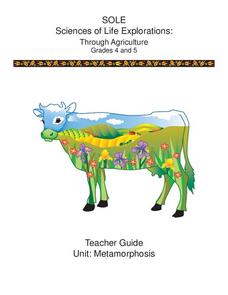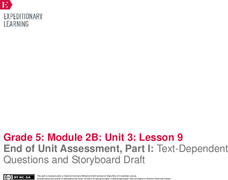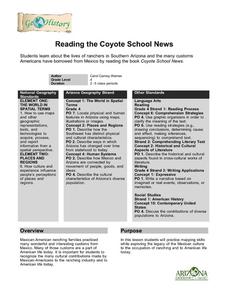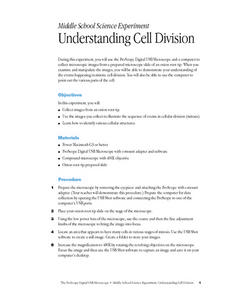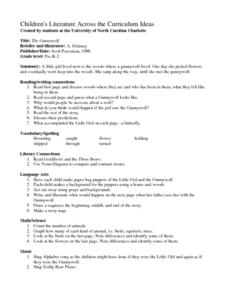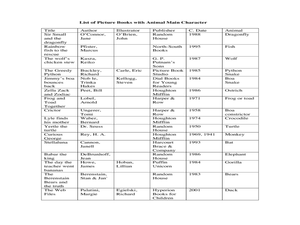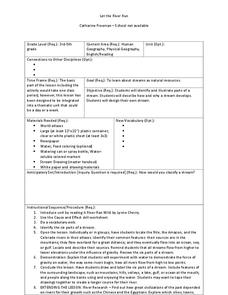Curated OER
Seeing Dots
Your algebra learners interpret algebraic expressions, in order to compare their structures, using a geometric context. They also discern how the two expressions are equivalent and represent a pattern geometrically and algebraically.
Curated OER
Amos and Boris: Text Study
Twenty insightful questions follow a read aloud of the story, Amos and Boris by William Steig. Scholars then show what they know through completion of a cause and effect chart, reading fluency assessment, and a written explanatory or...
Cornell University
Metamorphosis
Looking for an insect unit that addresses multiple skill strategies? Young entomologists explore multiple life cycles of insects that go through metamorphosis. The brainteasers and mobile activity spark learner interest before guiding...
EngageNY
Counting Rules—The Fundamental Counting Principle and Permutations
Count the benefits of using the resource. The second installment of a 21-part module focuses on the fundamental counting principle to determine the number of outcomes in a sample space. It formalizes concepts of permutations and...
Howard Hughes Medical Institute
Virus Explorer
Most pupils know about the flu, HIV, and other viruses, but they don't know what each actually looks like. This interactive shows their relative size, structure, and allows for comparisons. It stresses the similarities and differences...
Montana State University
Everest Extremes: Biodiversity
How many animals can live in a climate as cold as Mount Everest's? Find out with a science instructional activity all about biodiversity. Activities include research, presentations, group work, coloring maps, and a simulation of a food web.
Beverly Hills High School
The French Revolution
Aspiring filmmakers and budding historians alike will love a storyboard project on the French Revolution. Learners plan a Hollywood blockbuster, complete with script and full storyboards, that cover important events of the French...
EngageNY
End of Unit Assessment, Part 1: Text-Dependent Questions and Storyboard Draft: “You Can Do a Graphic Novel” Excerpt
Eyes on the finish line. Serving as the first part of the end of unit assessment, learners answer questions based on a text about how to write a graphic novel. Using what they've learned, they then create a storyboard about the invention...
Curated OER
A Look At Osteoporosis
Eleventh graders study osteoporosis and understand the relationship between calcium and bone mass. In this investigative instructional activity students participate in an activity in which they graph and construct basic bone biology.
San Francisco Symphony
The Sound of Oklahoma's History
Learners will research what life in Oklahoma was like prior to and after the Oklahoma Land Run. They'll examine photographs and paintings that show Oklahoma before and after the land run, then they'll draw their own representations of...
Curated OER
Small and Large Squares
Young mathematicians classify squares according to attributes. They sort squares according to specific attributes. Students explore squares in repeating patterns and order squares according to size. Engaging extension activities are...
Curated OER
Consecutive Integer
Young scholars solve problems with consecutive integers. In this counting instructional activity, students create formulas for odd and even consecutive integers. They complete a worksheet, homework and work problems on the board.
Environment Agency - Abu Dhabi
Earthquakes
What causes earthquakes? What are the effects and impacts of earthquakes? How are earthquakes measured? If there was an earthquake on Mars, would it still be considered an earthquake? Class members will find the answers to these and many...
Curated OER
What's the Difference?
Young scholars analyze the similarities in different species. This instructional activity is part of a multi-segmented unit on the diversity of life. In this segment, students classify shoes to mimic the scientific categories of the...
Curated OER
Writing Learning Logs
Students read a book about Abraham Lincoln. Using a log, they write factual information from the book. As a class, they discuss what they believe childhood was like in the middle to late 1800s. They fill out a KWL chart before beginning...
Curated OER
Reading the Coyote School News: Lives of Ranchers in Southern Arizona
Fourth graders examine the effects of Mexican-American ranching on life today.
Curated OER
Understanding Cell Division
Pupils collect and describe cells from an onion root tip which are undergoing the stages of cell division. They use a ProScope USB microscope to identify and compare cells in five phases of mitosis.
Curated OER
Some Days Are Like That!
Second graders engage in an activity of reading a story and have a discussion about the story to measure comprehension. The use of a graphic organizer helps student retention because it is brain compatible for students.
Curated OER
Outstanding Fields of Corn
Students will show knowledge of the five themes of Geography by creating a Diorama. This activity allows the student to use their knowledge of corn, including both past and present information and apply it to the five themes.
Curated OER
The Great Kapok Tree..
Students predict what each animal in the story read says and then compare them. They pretend that a tree was cut down and write a new ending for the story. Students explain why the story is not true and create a Venn Diagram comparing...
Curated OER
The Gummywolf
Students read a story about "Gummywolf," stopping periodically to answer questions about the progression of the story. Next, they create a Venn Diagram to compare and contrast "Gummywolf" to "Goldilocks and the Three Bears." Students...
Curated OER
Acrostic Book Report
Learners read the story Wild Horse Winter and construct acrostic poems. In this poetry lesson, students use adjectives and events in the text to develop an acrostic poem.
Curated OER
Find an Animal! Find a Book!
Learners identify the themes of different books by classifying their genre. In this genre lesson, students examine a specific animal by reading both a nonfiction and fiction book about the species. Learners compare the different books...
Curated OER
Let the River Run
Students explore the environment by reading a story in class. In this water formation lesson, students define environmental terms such as rivers, streams, gulf, oceans and lakes. Students read the story A River Ran Wild and discuss the...




